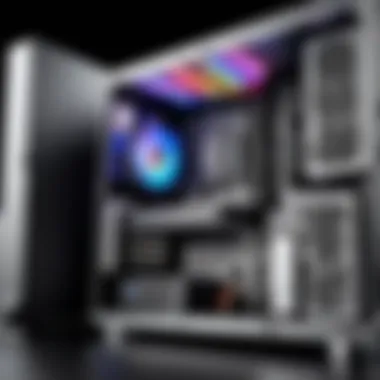Gaming PC Brands to Avoid: Cautionary Insights


Intro
In today's gaming world, the choices for building or buying a gaming PC are abundant, yet not all options are created equal. The market is thick with brands boasting jaw-dropping specifications and flashy designs, but underneath the vibrant exterior, some of these brands harbor significant issues that can be detrimental to the gaming experience. Choosing the wrong gaming PC can lead to a series of frustrations, whether it's from poor customer support, subpar performance, or glaring quality control problems.
In this exploration, we'll dissect brands that are best avoided, underpinning the reasons behind their negative impressions. We'll dive into areas such as brand reputation, performance evaluations, and customer feedback. Through this analysis, we hope to arm prospective buyers with insider knowledge that illuminates the pitfalls of certain brands, allowing for wiser purchasing decisions.
Product Overview
Brand information
In voicing concerns about specific gaming PC brands, it's crucial to first understand who these players are on the field. Brands like CyberPowerPC, iBUYPOWER, and HP Omen have garnered mixed reviews over the years. While some praise their aesthetics and price point, others have reported significant issues with service and quality, arguably tarnishing their reputation among seasoned gamers.
Key specifications
Let's look at key specifications. While many of these brands market their systems with powerful processors like the Intel i9 or AMD Ryzen 9 lines, higher specs do not always equate to better performance or reliability. For instance, a CyberPowerPC system might feature a high-end graphics card but could skeletonize under heavy gaming loads due to inadequate thermal management. This contradiction raises eyebrows among buyers who seek dependable performance alongside impressive specs.
Pricing
Pricing plays a pivotal role. Companies such as iBUYPOWER may offer fantastic deals for seemingly unbeatable configurations. Nevertheless, what they do not disclose upfront often lurks in the shadows—subpar components or limited warranties that manifest issues post-purchase. Such pricing and performance discrepancies make customers wary, ultimately prompting a need for this critical insight.
Performance Comparison
Benchmark tests
Comparing the performance of key gaming systems requires a detailed look at benchmark tests conducted by expert reviewers. Brands like Alienware and ASUS generally trend positively, with consistent performance across different gaming scenarios. On the contrary, lesser-regarded brands such as CyberPowerPC and iBUYPOWER can struggle to keep up with demanding titles, leading to lag and stuttering, particularly in competitive environments.
Speed and efficiency comparisons
Efficiency, too, cannot be overlooked. While some brands may tout high-speed performance, they often lack energy efficiency. This means that gamers could face overheating issues or increased power bills over time. A more prudent choice would be a brand with a well-balanced approach to both speed and efficiency, ensuring sustainable gaming experiences.
Features and Technology
Unique features
When analyzing features, many buyers are drawn to RGB lighting or cool case designs. However, style over substance comes at a price if the internal components can't hold their own. Unique features should enhance usability rather than distract from performance quality.
Technological advancements
Brands like Razer invest heavily in technological advancements, providing an enriching experience through their proprietary software and peripherals. Meanwhile, others lag behind, offering only basic options that fail to impress the tech-savvy gamer. Aligning with a brand that prioritizes innovation is worth considering for anyone serious about gaming.
Compatibility with other devices
Lastly, compatibility can be a dealbreaker. Brands that create an overall ecosystem of products—like ASUS with their motherboards and gaming peripherals—provide seamless integration. On the other hand, when brands don’t prioritize compatibility, it can lead to frustrating setups and limit gameplay experiences.
Pros and Cons
Strengths of the product
Some brands offer unbeatable prices and appealing designs. They often succeed in attracting first-time buyers or those on a budget.
Areas for improvement
However, the glaring weaknesses—such as customer service pitfalls and reliability issues—must be addressed. Many reports indicate long wait times for support or inadequate responses, contributing to a poor customer experience.
Value for Money


Cost-effectiveness
While the initial offering may seem appealing, it’s essential to evaluate overall value for money. A cheaper PC might require costly upgrades sooner than expected, particularly regarding cooling solutions or power supplies, counteracting any upfront savings.
Long-term benefits
Investing in a reliable gaming rig usually pays off in the long run with fewer repairs and better performance longevity. A rigorous investigation into a brand's reputation often sheds light on their reliability.
Comparison with similar products
Comparison is vital. How does a budget-range system from HP Omen stack against a more reputable brand like MSI? Often, favorable comparisons reveal not just performance, but the quieter life that comes with solid customer service and dependable products.
In summary, navigating the world of gaming PCs requires due diligence. By understanding the pitfalls of certain brands, consumers can save themselves from a virtual quagmire filled with disappointment.
Preface to Gaming PCs
In the bustling world of gaming, the demand for high-performance machines has driven the growth of the gaming PC market. Understanding this landscape is crucial for gamers and tech enthusiasts alike. It’s not just about having powerful hardware; it's about making educated choices that align with user needs and expectations. Selecting the right gaming PC can mean the difference between smooth gameplay and frustrating lag.
Understanding the Gaming PC Market
The gaming PC sector has exploded in recent years, with brands vying for the attention of a diverse consumer base. From hardcore gamers seeking top-tier specifications to casual users wanting a decent setup, the market caters to all. However, not every brand stands firm amidst fierce competition.
Price, specifications, and brand reputation play significant roles in shaping consumer choices. Many buyers feel overwhelmed by flashy marketing and complex jargon. This often leads to buying decisions made on impulse rather than informed reasoning.
In addition, the presence of countless brands can complicate matters. Players may find themselves entangled in the web of brand loyalty while overlooking essential factors such as build quality and customer support.
"The best gaming experience starts with the right equipment, but the right equipment starts with the right brand."
The Importance of Choosing the Right Brand
Choosing the right brand is not just a matter of preference but a necessity. The gaming PC is an investment, often worth hundreds or thousands of dollars. A poorly made system can lead to frequent breakdowns and performance hiccups, which is exactly what any gamer wants to avoid.
Brands that have a history of poor customer service or unreliable products can sour the gaming experience. It is vital to research and understand the options available. Insights into a brand’s reputation can arm consumers with the knowledge needed to dodge potential pitfalls.
When considering a purchase, one must also evaluate the long-term implications of brand choice. Many gamers seek systems that allow for upgrades down the line. A brand that offers customizable options and accessible components generally indicates a commitment to quality and customer satisfaction.
Factors to Consider When Choosing a Gaming PC Brand
When it comes to selecting a gaming PC brand, there are several pivotal factors to keep in mind. Making an informed decision impacts not only your gaming experience but also your wallet. The gaming landscape is nuanced. New brands pop up constantly, while established ones face scrutiny over their reliability and service. It’s like a game of chess; one wrong move can leave you in checkmate with a poorly chosen system.
Build Quality and Reliability
Firstly, let’s talk about build quality and reliability. This aspect is often overlooked; however, it is crucial for the longevity of your gaming rig. You wouldn’t want to invest in a gaming setup that falls apart or underperforms when the pressure is on during your marathon gaming sessions.
Good build quality ensures durability. A PC made from top-notch materials can endure the wear and tear of constant use. When searching for a gaming PC brand, scrutinize their reputation for using quality components.
- Look for branded parts: Reliable brands use well-known components like NVIDIA graphics cards or Intel processors. If you see poor quality, especially with crucial parts like the power supply or motherboard, that's a red flag.
- Consumer feedback: Checking reviews on forums or sites like Reddit can reveal patterns in build quality complaints.
- Warranty and guarantees: Brands that stand behind their products will often have better warranties. This speaks volumes about their confidence in their products' reliability.
Customer Service and Support
Another significant aspect is customer service and support. We’ve all heard horror stories, right? A gamer buys their dream machine only to find that when something goes wrong, support is unresponsive or downright dismissive. It can be infuriating when you need assistance and find yourself facing a wall.
Here’s why this matters:
- Accessibility: Do they have multiple channels for support? Look for brands that offer live chat, phone support, and thorough documentation.
- Response times: Before purchasing, check forums or review sites to gauge how quickly they respond to inquiries or complaints. You might find some brands leave their customers hanging like a player waiting for a respawn.
- RMA process: Investigate how easy it is to return or replace parts. A convoluted process can lead to extended downtime.


Performance and Specifications
Lastly, let’s dive into performance and specifications. This is where gamers often get drawn in by flashy marketing. But remember: just because it looks good on paper doesn't mean it performs well in real life. Key specifications, like CPU speed and GPU power, matter greatly, and they should align with your gaming needs.
When assessing specs, consider the following:
- Matching the product to your games: If you're into high-demand games like Cyberpunk 2077, you need robust hardware. Conversely, casual games don’t require as much power.
- Benchmarking results: Look at comparisons online or on YouTube. Sometimes, actual performance varies from the specifications offered.
- Heat management: Pay attention to cooling systems. Computers that get too hot tend to throttle performance, so ensure the brand has effective cooling solutions.
"Selecting the right gaming PC brand boils down to understanding the nuances behind their quality, support and specs. Ignorance could lead you down a troublesome path."
In summary, these factors—build quality, customer service, and performance specifications—play pivotal roles in your gaming experience. Choose wisely, and you may find a brand that enhances your gaming sessions and keeps frustrations at bay.
Brands with Poor Reputation
Understanding the landscape of gaming PC brands is essential for making informed decisions. Some brands carry a heavy burden of negative perceptions, and it’s crucial to pinpoint why they tend to raise eyebrows. Poor reputations often stem from issues such as inconsistent quality, lackluster customer service, and disappointed performance promises. This segment of the discussion unveils not only the brands that one should keep at arm’s length, but also the reasons behind their tarnished images. Buyers are less likely to engage with these brands once they familiarize themselves with the common pitfalls, gaining confidence and assurance in their purchasing choices.
Overview of Brands to Avoid
When the dust settles in the realm of gaming PCs, certain brands consistently come under scrutiny. No one likes to gamble their hard-earned money on a product that could leave them feeling frustrated. Brands often highlighted by users and experts in the gaming community include those infamous for late product releases, poor hardware integration, or unsupported software. Investing in certain brands can lead to consistent headaches, meaning some buyers don’t just get what they pay for – they might end up spending much more in repairs, upgrades, or replacements down the line.
Commonly mentioned names that gamers often wish to steer clear of consist of:
- Brand A: Known for its longstanding issues with performance.
- Brand B: Notorious for their customer service failures.
- Brand C: Struggles with inferior build quality.
In this section, we will give a closer look into these problematic brands to understand their shortcomings better.
Brand Analysis: A Detailed Look
Delving deeper into specific brands with a reputation for underperforming sheds light on various issues that potential consumers should be wary of. Let’s dissect these brands and their associated complaints to get a clearer picture.
Brand A: History and Performance Issues
Brand A has a colorful history marked by ambitious promises but often falling short in practice. Their products, while marketed with cutting-edge specs, have consistently underwhelmed in real-world performance scenarios. Users frequently report overheating issues, which can lead to throttling during critical moments in gameplay, not to mention malfunctioning components just after the warranty expires. One unique aspect that draws some buyers initially is their attractive pricing. However, many find that the so-called savings might just lead to more expenses in repairs or upgrades, making the initial bargain less beneficial.
Brand B: Customer Service Failures
Brand B often sits at the bottom of customer satisfaction polls. Reviews from users paint a dismal picture when it comes to reaching out for support. Complaints about long wait times, unresponsive service representatives, and unresolved issues pile high. Gamers sharing experiences recount tales of sending their PCs for repairs, only to receive them back without any fix, or worse - with new issues. Despite having a few visually appealing models in their line-up, it's the lack of decent after-sale support that makes this brand a risky choice for many.
Brand C: Inferior Build Quality
Brand C promises a lot but seldom delivers when it comes to build quality. Reviews indicate that their cases tend to be flimsy and components are often not properly secured. Users frequently report parts rattling or becoming loose with regular use. While the brand attempts to market its systems as gamer-friendly, the truth is more disappointing. This brand’s budget-friendly approach seems to attract many first-time buyers, but they often find that the compromised quality results in hardware failures sooner than expected. New buyers may gravitate towards lower prices, yet they soon learn that the cost of ownership is significantly higher due to frequent repairs or replacements needed for components that should have lasted longer.
Ultimately, avoiding these brands can lead to a smoother gaming experience and less time spent dealing with issues that could have been sidestepped by making a more informed choice in the first place.
Consumer Experiences and Reviews
Understanding consumer experiences and reviews is crucial when navigating the complex world of gaming PCs. These insights provide real-world perspectives that often go beyond the polished marketing materials and promises put forth by brands. When a user shares their tale, it's not just a narrative; it’s a set of data points that can illuminate the strengths and weaknesses of a product. This information is vital for potential buyers in assessing not only technical specifications but also the trustworthiness of the brands they are considering.
By paying attention to consumer feedback, buyers can gauge reliability, durability, and customer service, which can dramatically impact their overall satisfaction with a purchase. When sifted through correctly, these experiences help you avoid costly missteps. In this segment, we will analyze common grievances and how they shape the broader perception of brands.
Common Complaints from Users
While every consumer is different, certain patterns tend to emerge within the gaming community. A few complaints ring out louder than others:
- Performance Issues: Many users report lag, crashes, or components failing sooner than expected. This sort of drop in performace can break the immersive experience gamers desire.
- Build Quality Concerns: High expectations clash with reality when poorly constructed parts lead to hardware failures. Some customers have detailed instances where their units sounded like rattling tin cans due to inferior materials.
- Cooling Solutions: When heat levels rise, so do frustrations. Users often complain about inadequate cooling systems, leading to overheating and ultimately risking hardware failure.
- Customer Service Frustrations: A common thread ties many grievances together: unsatisfactory customer service. Whether it's long response times to warranty issues or unhelpful representatives, users factor this into their brand loyalty.


These ongoing issues aren't merely anecdotal; they represent the sum of collective experiences, and they deserve scrutiny.
"A single dissatisfied customer can tell a tale that echoes through the digital concourse; just a handful of bad reviews can tarnish a brand's reputation for years to come."
Impact of Negative Reviews on Brand Image
Negative reviews can have a seismic impact on a brand's reputation. In today's interconnected world, a single bad experience can spread like wildfire. When unhappy consumers take to platforms like Facebook or Reddit to air their grievances, the consequences can be far-reaching. A brand that neglects its customers will often find itself facing a growing mountain of complaints, overshadowing positive feedback.
The impact can be categorized into several key areas:
- Perception Shifts: Potential customers tend to gravitate toward brands with glowing reviews. Negative feedback can shift public perception dramatically, leading to hesitancy or outright avoidance of certain brands.
- Decreased Sales: When a significant number of consumers report dissatisfaction, sales figures often take a nosedive. Brand survival depends heavily on consumer confidence, which can be hard to rebuild once lost.
- SEO Consequences: Negative reviews can also affect a brand’s search engine rankings. When consumers search for information, they might stumble upon critical reviews first, steering them away from the brand.
In the tech world, where word travels fast, a solid foundation built on positive reviews can be easily undermined by a few bad apples.
As this article progresses, it's essential to keep these elements in mind. Consumer insights, both positive and negative, weave a narrative that is invaluable to tech enthusiasts, gamers, and IT professionals. Ignoring the wealth of information that comes from user experiences is akin to sailing blind on tumultuous seas. The better informed one is, the less risky the journey on the path to choosing a gaming PC.
Comparative Analysis with Reliable Brands
When it comes to purchasing a gaming PC, understanding which brands are reputable can make all the difference. This section delves into a comparative analysis that sheds light on the brands known for their quality and service, allowing consumers to have a hopeful outlook rather than fear and uncertainty. Proper insights in this area can better inform potential buyers, arming them with knowledge that enhances their shopping experience.
Brands Known for Quality and Service
In the gaming PC landscape, brands that consistently deliver quality and excellent service stand out. These brands not only create reliable machines but also offer support that leaves customers satisfied. In this analysis, we consider two crucial performance characteristics: performance metrics and customer support ratings.
Comparison of Performance Metrics
Performance can be a deal-breaker or maker in the gaming world. In this particular context, performance metrics refer to various benchmarks that gauge how well a gaming PC can handle demanding tasks.
A key characteristic of performance metrics is the ability to provide measurable data, such as frame rates in FPS (frames per second) and processing speed in terms of GHz. These metrics offer a clear representation of a gaming PC's capabilities. Brands like ASUS and Alienware tend to excel in these aspects, drawing gamers who prioritize high-quality visuals and seamless gameplay.
One unique feature of many high-end gaming PCs is their capability for overclocking, which allows users to push hardware performance beyond standard specifications. This can be a double-edged sword; while it offers improved performance, it can also increase the risk of overheating and potential damage if not managed properly. Therefore, understanding these metrics allows consumers to pinpoint the right machine that matches their gaming needs without compromising on safety.
Customer Support Ratings
Excellent customer support can make or break a customer's experience, especially when tech glitches occur. Customer support ratings reflect how well a brand responds to issues, importantly influencing a gamer’s trust in a product.
In the context of this discussion, brands like HP and Dell have built reputations for offering solid customer service. They feature extensive support portals, community forums, and direct customer service lines that cater to their client’s needs.
A unique appeal here is brand reliability. If a problem arises, knowing that help is easily accessible can provide peace of mind. However, some brands don’t fare well in this department; they might have products that perform reliably yet offer customer service that leaves people feeling stranded. Hence, understanding customer support ratings becomes essential for discerning buyers.
"A good gaming PC is like a trusty steed; it should never leave you in the lurch, especially in the heat of battle."
In summary, by analyzing performance metrics and customer support ratings, consumers engage in a more informed decision-making process. It allows them to focus on brands that not only meet performance expectations but also provide dependable support when the chips are down.
Finale: Making an Informed Decision
At the end of this exploration into the landscape of gaming PC brands, it's crucial to emphasize the position of smart decision-making. When diving into the world of gaming PCs, the stakes are high, not just financially but also in terms of performance and longevity. Consumers, especially those who are passionate gamers or IT enthusiasts, must navigate a marketplace that often abounds with brands that may not live up to their promises. Making an informed decision here isn’t just beneficial; it’s essential.
Summarizing Brand Risks
The discussion throughout this article has highlighted several noteworthy risks associated with certain brands. These include:
- Quality Concerns: Many brands have been noted for delivering subpar components, leading to dissatisfaction and frustrations. When the hardware fails, so does the gaming experience.
- Customer Service Issues: Consumers frequently encounter hurdles when seeking support or product repairs. Poor responsiveness can hamper your ability to resolve any issues promptly.
- Inconsistent Performance: In the gaming world, performance matters a great deal. Choosing a brand that doesn't maintain consistent quality can leave users high and dry during critical moments in gameplay.
These risks culminate in a significant need for vigilant evaluation when selecting a brand. It's not merely about the price tag; it’s about understanding what you’re truly getting.
Final Recommendations for Consumers
As we draw the curtain on this analysis, here are some significant takeaways for consumers:
- Do Your Homework: Read reviews from trusted sources like Reddit or tech forums. User experiences often paint a clearer picture than marketing strategies.
- Prioritize Brands Proven for Quality: Look for companies with a consistent track record. It may mean spending a bit more, but you'll save on potential headaches later.
- Consider Customer Support: Research how brands handle customer queries and issues. Companies that have robust support systems often stand by their products.
- Watch Out for Trends: Some brands may temporarily gain popularity due to viral marketing but lack substance in actual performance.
- Seek Expert Recommendations: Consulting expert reviews or tech articles can guide you in making more informed choices.
"Your choice of a gaming PC brand can make or break your gaming experience; do not take it lightly."







